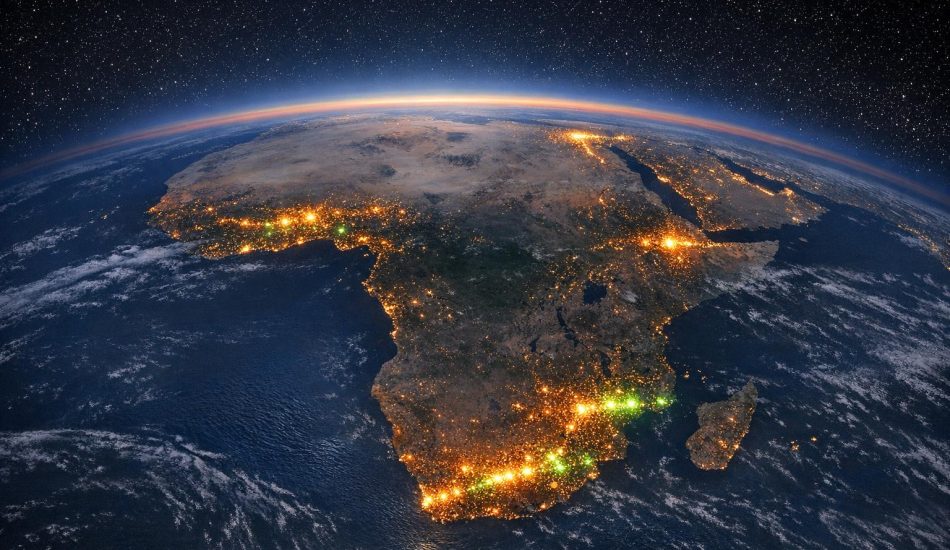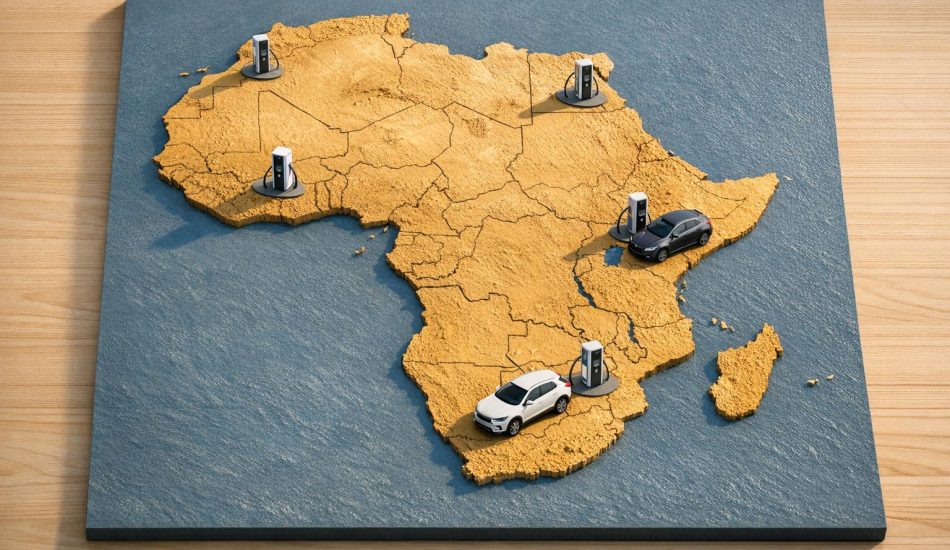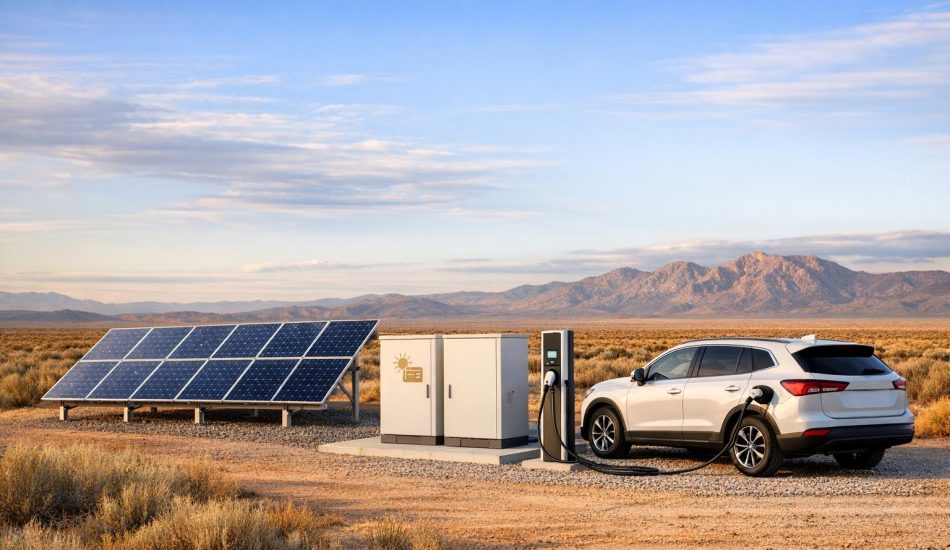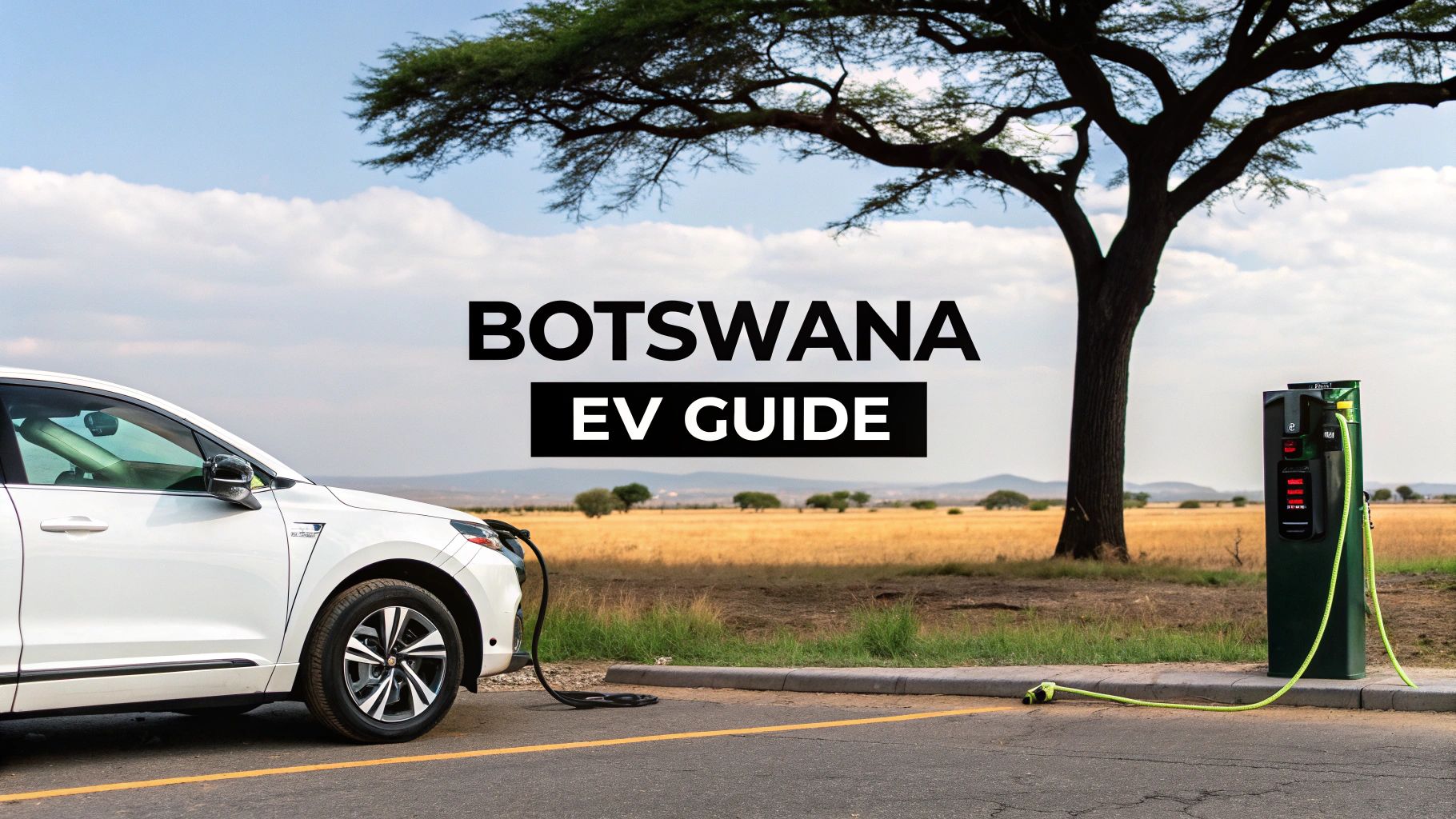
So, you're thinking about going electric in Botswana? It’s a big move, but one that's quickly becoming a smart and rewarding choice. This guide is designed to be your go-to resource for everything you need to know to buy an electric car in Botswana, from picking the perfect model to handling the import process with experts like EV24.africa.
What's It Really Like to Own an EV in Botswana?
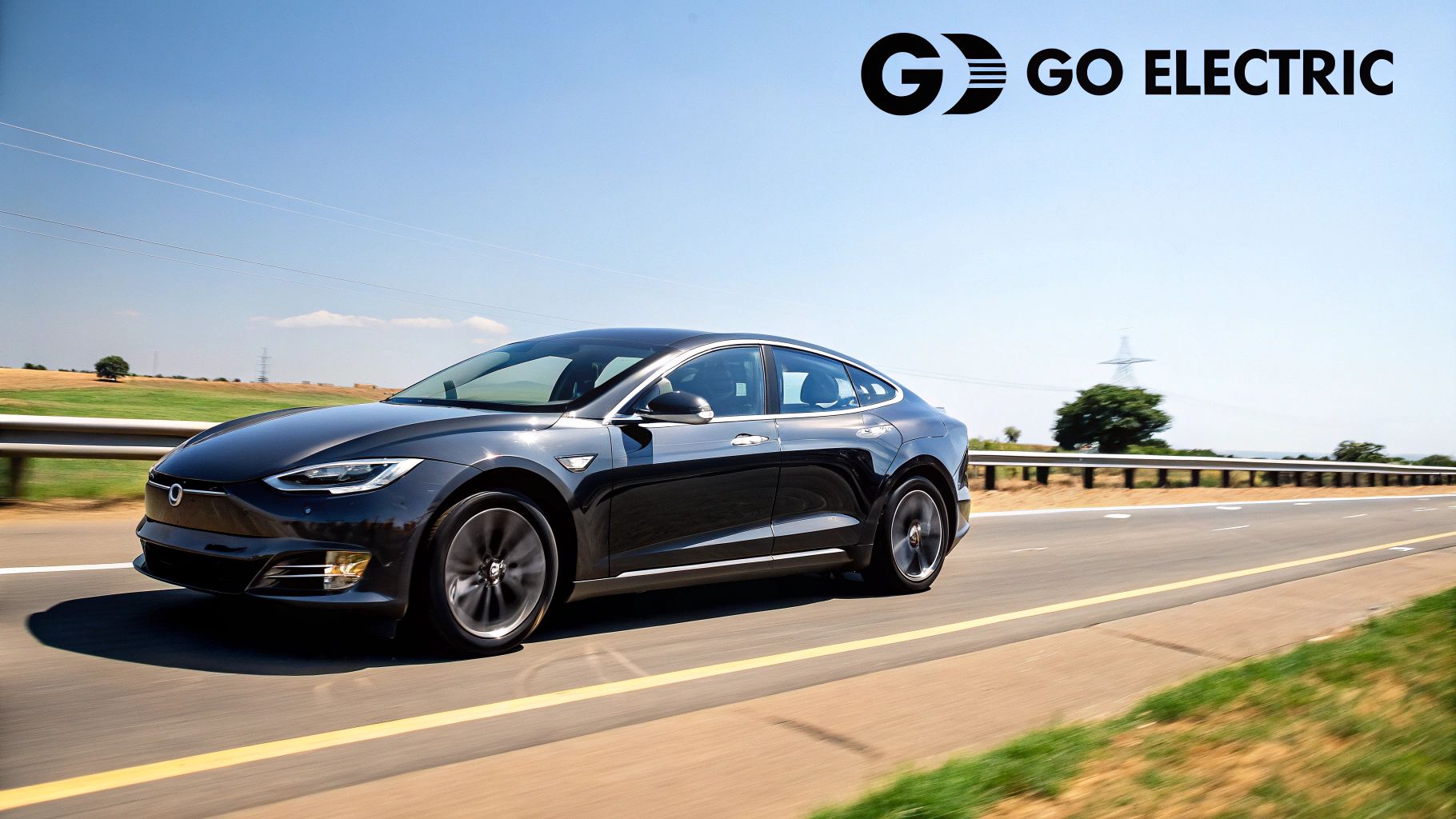
Let's be real—the thought of owning an EV in Botswana might seem a bit daunting at first. You're probably wondering about charging stations, maintenance, and if it's genuinely practical for your day-to-day life. The great news is that the situation on the ground is improving fast, making electric cars a very real and sensible option for drivers here.
The first perks you'll notice are the financial and practical ones. Just picture it: no more long queues at the petrol station, and waking up every single morning with a "full tank." The running costs are a game-changer. Electricity is far cheaper than petrol, and with no oil changes or complex engine parts to worry about, maintenance becomes refreshingly simple.
Botswana’s Unique Advantage
Botswana is in a fantastic position to lead the way in electric mobility. Our abundant, year-round sunlight is perfect for solar-powered charging, which opens the door to a truly sustainable transport system. What's more, Botswana is rich in key minerals needed for EV manufacturing, such as cobalt, lithium, and nickel.
This isn't just theory; things are already happening. The EV market is still young but has incredible potential, fuelled by our own natural resources and industrial ambitions. A major step forward is the plan for local EV assembly by Gaborone-based Baylee Enterprises (Pty) Ltd, which is importing core components to build vehicles right here. You can dig deeper into these market developments and see how they're shaping the country’s EV future.
The real win of going electric in Botswana isn't just about saving money on fuel. It’s about being part of a quieter, cleaner, and more self-sufficient transport future for the entire country.
This guide will walk you through the whole journey, step by step. We'll cover:
- How to find an EV that fits your lifestyle and Botswana's driving conditions.
- Getting to grips with the import and registration process.
- Feeling confident about daily charging and driving.
By the time you're done, you’ll have a clear, actionable plan to make the switch to electric.
Choosing the Right EV for Botswana Roads
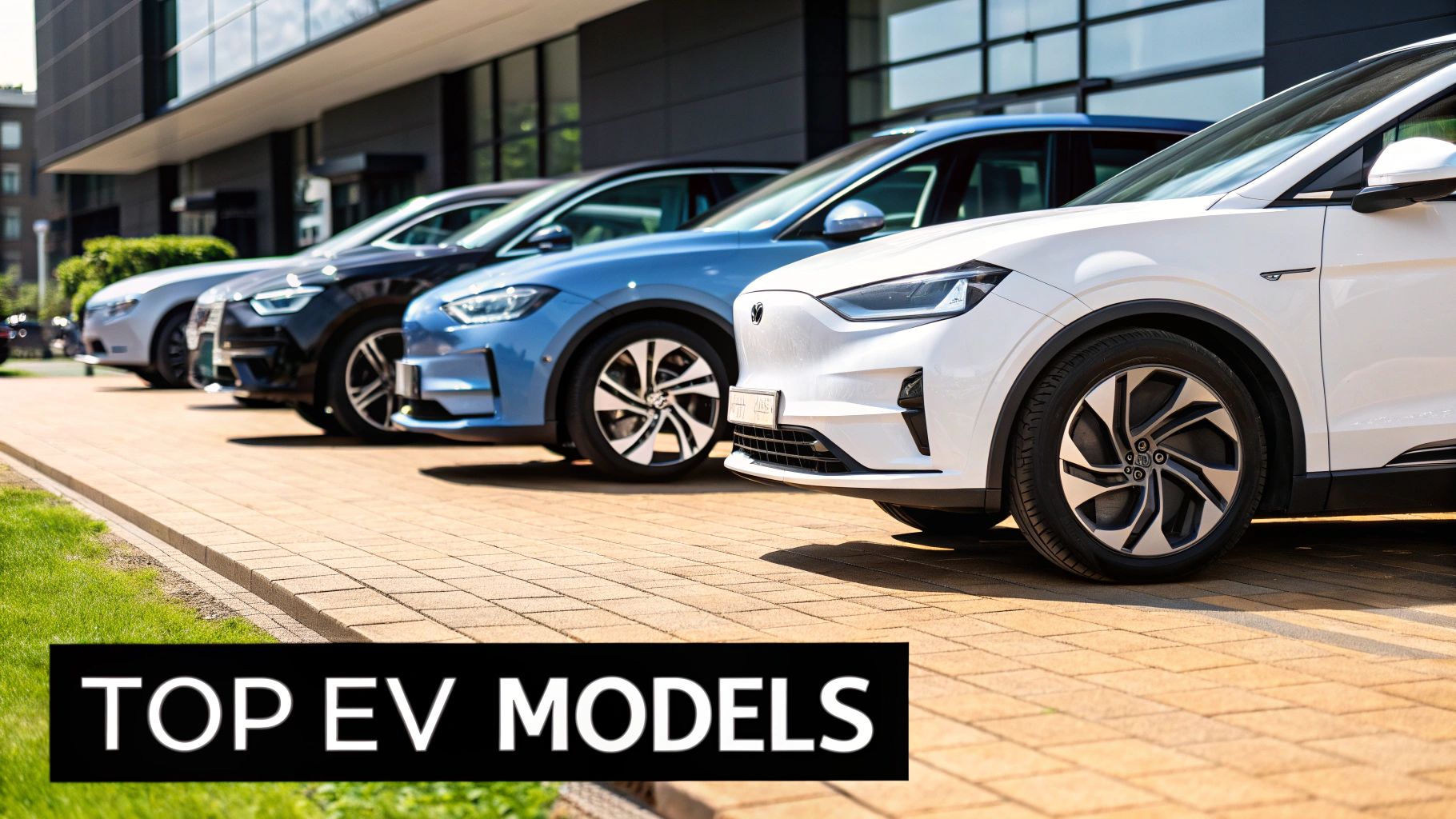
When it comes to picking an electric vehicle for life here in Botswana, it’s about more than just a sleek design or impressive specs. You've got to think practically about your day-to-day driving, our local climate, and the roads you’ll actually be using. A generic car review from Europe or the US just won't cut it.
The best starting point is your own routine. A daily commute across Gaborone is one thing; planning a long weekend trip up to Kasane is a completely different ball game. Be realistic about how far you really drive. Are you mostly doing quick trips around town, or do you often need to tackle longer distances? This is the single biggest factor that will steer you toward the right battery range.
Figuring Out Your Real Range Needs
It's easy to get fixated on the highest possible range figure advertised by a manufacturer. My advice? Focus on what you actually need. For most of us, an EV with a real-world range of 300-400 km is plenty, especially since you can just plug it in overnight at home.
Think about it this way:
- The City Dweller: If you spend most of your time in Gaborone or Francistown, a model with a more modest battery and around 250 km of range can be a fantastic, budget-friendly choice. A used Nissan Leaf, for example, fits this profile perfectly.
- The Long-Distance Driver: For anyone regularly travelling between cities, a larger battery that delivers 450 km or more is a wise investment for peace of mind. This is where models like the Hyundai Kona Electric or Volkswagen ID.4 really shine.
Don't Forget Climate and Road Quality
The good news is that Botswana’s warm climate is actually great for EV batteries, as they perform best in the heat. The catch? Blasting the air conditioning on a hot day can reduce your range by as much as 15-20%. It’s crucial to factor this in, especially when you're planning a long drive in the middle of summer.
Road quality is another big one. Our main roads are generally in good shape, but if you frequently find yourself on gravel or rougher surfaces, you need an EV that can handle it. An electric SUV with higher ground clearance and a tougher suspension will always be a smarter, more durable choice than a low-slung sedan.
The real goal is finding an EV that fits your life in Botswana, not just some idealised version of it. I always tell people to prioritise practical range and durability over fancy features they'll rarely use.
This is where a platform like EV24.africa becomes so helpful. You can filter their listings by range, body type, and price, which makes it much easier to narrow down the options to cars that are genuinely a good fit for our local conditions. It helps you buy an electric car in Botswana feeling confident in your choice. For a deeper dive, our guide on choosing the right EV for your needs in Africa is a great resource.
This more thoughtful approach is catching on across the continent. Africa’s electric vehicle sales more than doubled in 2024 to nearly 11,000 units, showing a clear shift in consumer interest. The market is projected to see revenues hit approximately $209.9 million by 2025, with sales growing at an annual rate of about 10.6%. Explore more insights on Africa's evolving EV market and what to expect next.
Making Sense of the Import Process
Bringing your chosen electric car into Botswana might seem like a maze of paperwork and logistics, but it's a surprisingly straightforward journey when you know the route. It all begins thousands of kilometres away, usually in a major hub like the United Kingdom or Japan where the market for high-quality, pre-owned EVs is mature.
Think of it as a well-coordinated chain of events. A specialist service, like EV24.africa, will first track down the specific model you're after. Once you give the green light, they conduct essential pre-export inspections to make sure the car is in top-notch condition before it even sees a shipping dock. This upfront quality check is absolutely critical to avoid any nasty surprises down the line.
From Sea to Soil
With the car sourced and checked, it's time for the ocean voyage. Your EV will be shipped to the port of Durban in South Africa, which acts as the main gateway for almost all vehicles heading into Southern Africa. From there, you've got a couple of choices for how it travels.
- Roll-on/Roll-off (RoRo): This is the go-to method for most people. It's cost-effective and simple—your car is driven onto a purpose-built vessel and secured for the trip.
- Container Shipping: For a bit more protection, your EV can be loaded into its own shipping container. This is a solid choice for more expensive vehicles or if you happen to be shipping personal effects at the same time.
Whichever option you go with, marine insurance is non-negotiable. It’s the safety net that protects your investment against the unpredictable nature of a long sea journey. Skimping here is a risk not worth taking.
I often tell clients to think of the import process like a relay race. Your import partner is the team captain, making sure every handover—from seller to shipper to the final overland transporter—is perfectly executed. Your job is just to be ready at the finish line.
The Final Stretch Inland
Once your EV touches down in Durban, it's on the home stretch. The vehicle is offloaded, and all the transit documents are sorted for its trip across the border into Botswana. From there, a trusted overland car carrier takes over, bringing your new car directly to your doorstep, typically in Gaborone.
The whole system is designed to let you buy an electric car in Botswana without ever having to get tangled up in the complex logistics yourself.
This flow chart gives you a quick visual on how things like government rebates are typically managed once your vehicle is registered in the country.
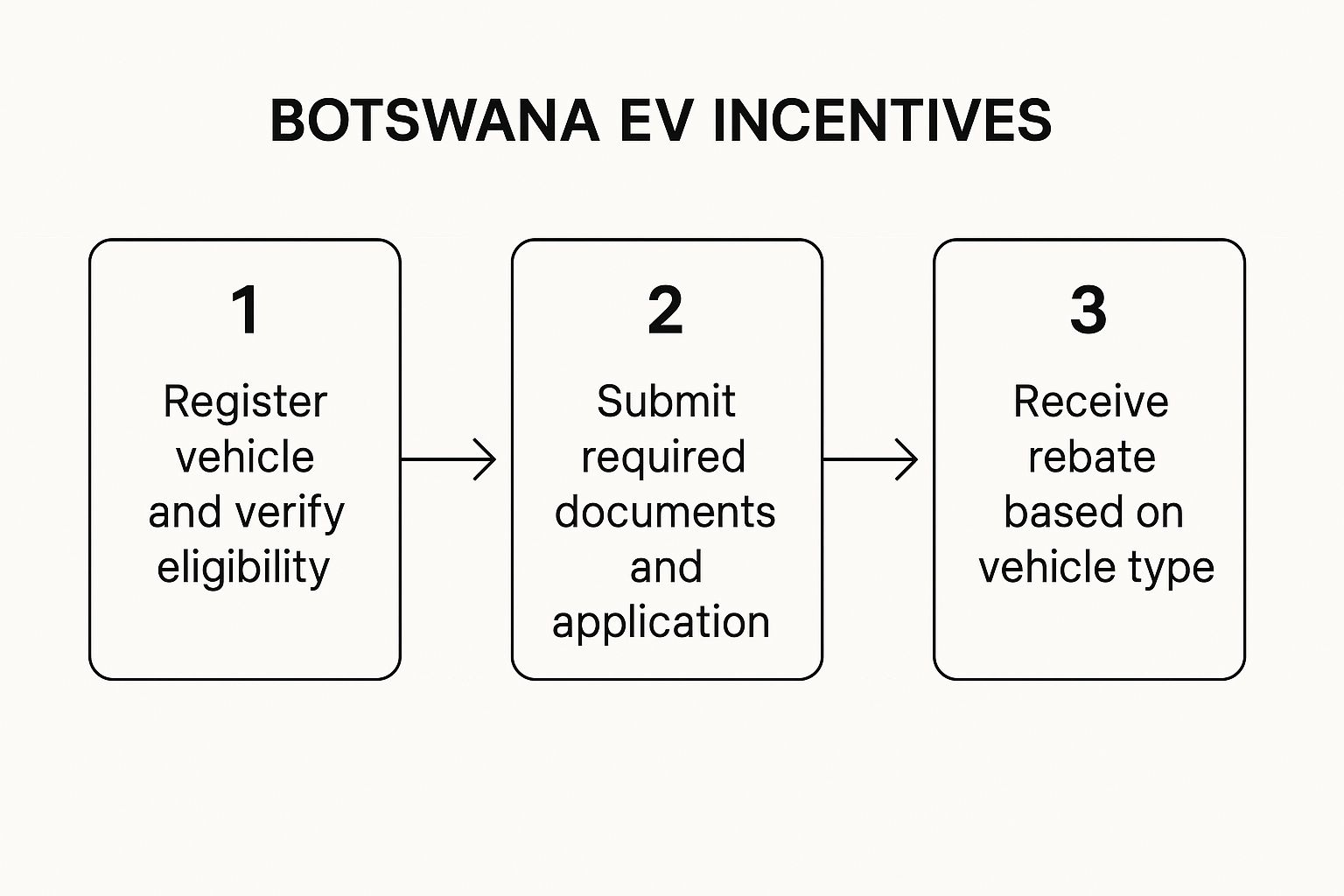
As the graphic shows, getting access to potential incentives is a clear sequence: you register the car, submit an application, and then the rebate is processed.
Of course, knowing the steps is only half the battle; understanding the costs is just as crucial. For a full breakdown of the numbers, have a look at our detailed Botswana EV import guide on duties and the approval process. Working with an expert turns a process full of unknowns into a clear, predictable timeline from start to finish.
Clearing Customs and Getting Registered
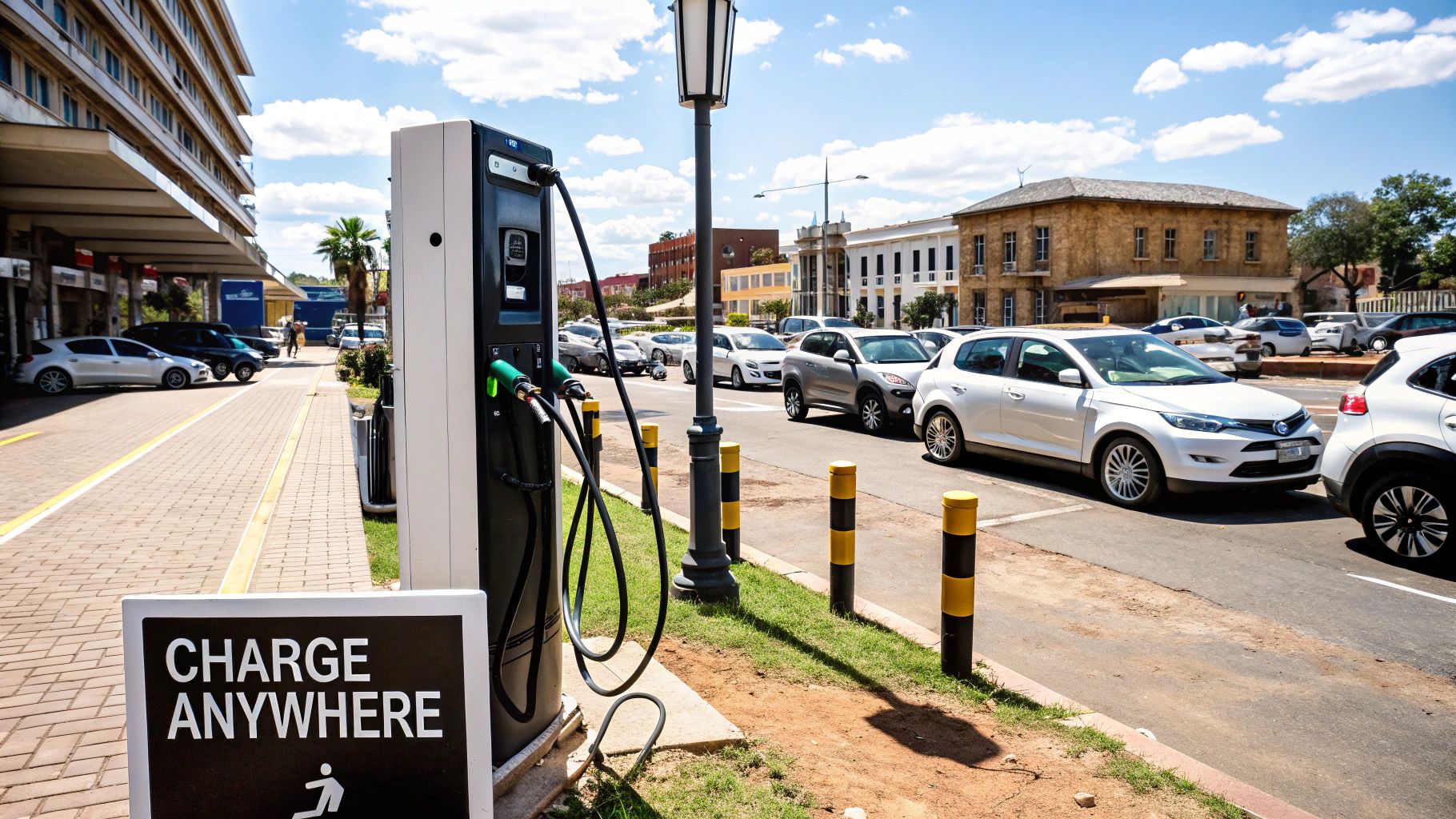
So, your EV has finally landed in Botswana. This is the home stretch, but it involves navigating the final, crucial administrative steps. Getting through customs and registering the vehicle can feel like a mountain of paperwork, but if you're prepared, it's a straightforward climb.
Your first stop is with the Botswana Unified Revenue Service (BURS). They need to assess your vehicle to calculate the duties and Value Added Tax (VAT) you owe. This isn't just a number they pull out of thin air; it’s all based on the Cost, Insurance, and Freight (CIF) value of your car. This is why having a precise and accurate commercial invoice is absolutely critical—it’s the cornerstone of the whole valuation.
Working with an experienced partner like EV24.africa really pays off here. They make sure every document, from the purchase invoice to the shipping manifest, is perfectly in order. This attention to detail dramatically cuts down the risk of delays or valuation disputes at the border.
Getting Through BURS: Your Document Checklist
Think of this as your passport through customs. Without the right documents, your car isn't going anywhere.
Here's exactly what you'll need to have on hand:
- Original Commercial Invoice: Proof of what you paid for the EV.
- Bill of Lading: The shipping contract that followed your car on its journey.
- Export Certificate: The vehicle's de-registration papers from its home country (like the V5C logbook from the UK).
- Proof of Insurance: Showing the car was insured during transit.
- Your Personal ID: A valid Omang or passport.
Once you submit this bundle, BURS will issue an assessment notice detailing the customs duty and VAT payable. After you settle that bill, the car is officially released into your care. This is the point where many DIY importers hit a wall, often due to small paperwork errors that cause frustrating delays.
From experience, I’ve seen tiny discrepancies in paperwork snowball into weeks of back-and-forth with customs. A sharp clearing agent more than earns their fee by spotting these potential traps and sorting them out before they become serious headaches.
Estimated EV Import Costs for Botswana
To give you a clearer financial picture, it's helpful to see a breakdown of the potential costs involved when importing an electric vehicle. These figures are estimates and can vary based on the specific vehicle and its value, but they provide a solid starting point for your budget.
| Cost Component | Description | Estimated Percentage / Amount |
|---|---|---|
| Customs Duty | A tax on imported goods, calculated based on the CIF value of the vehicle. | Typically 25% of the CIF value. |
| Value Added Tax (VAT) | A consumption tax applied to the total of the CIF value and the customs duty. | Currently 14% in Botswana. |
| Clearing Agent Fees | The fee paid to a professional agent for handling the customs clearance process. | Varies, but expect P1,500 – P3,000. |
| Port & Handling Fees | Charges at the port of entry for offloading and managing the vehicle. | Can range from P2,000 – P5,000. |
| Registration Fees | Fees paid to the DRTS for registration, number plates, and the vehicle licence disc. | Approximately P1,000 – P2,000. |
Remember, these costs are in addition to the purchase price and shipping of the vehicle itself. Planning for them upfront ensures there are no unwelcome financial surprises when your car arrives.
Final Step: The Department of Road Transport and Safety (DRTS)
With BURS cleared, your last major stop is the Department of Road Transport and Safety (DRTS). This is where your EV is officially welcomed onto Botswana's roads.
First up is police clearance. You'll need to take the vehicle to a designated police station. An officer will inspect the chassis and engine (or motor) numbers, checking them against your import documents to confirm the car’s identity and ensure it isn't stolen. It's a simple but non-negotiable step.
Next, your car will undergo a roadworthiness inspection at a DRTS testing centre. A certified official will give it a thorough check-over to ensure it meets all local safety standards. The good news for EV owners? No emissions test required!
Once you have the green light from the inspection, you're almost there. You’ll hand over all your documents—the customs release forms, police clearance certificate, and inspection report—to the DRTS. They'll process your application and issue the coveted "blue book" (vehicle registration book) along with your official Botswana number plates.
And just like that, the journey is complete. It's time to hit the road and enjoy your new electric car.
Your Daily Life with an EV in Botswana
Alright, the paperwork is done, the new number plates are on, and now the real fun starts. Getting behind the wheel of your EV in Botswana isn't about giving things up; it's about shifting to a smarter, quieter, and frankly, more convenient way of getting around. The day-to-day of EV life is surprisingly simple and you'll find it becomes second nature in no time.
The biggest mental shift? How you "refuel." Kiss those weekly trips to the petrol station goodbye. Your new habit will be plugging in your car at home, just like your smartphone. Imagine waking up every single morning to a "full tank" – more than enough range to handle your daily commute and errands around Gaborone or Francistown.
Setting Up Your Home Charging
For almost every EV owner, a Level 2 charger installed at home is the way to go. It’s a small unit that a qualified electrician can mount on your wall, and it charges your car much faster than a standard plug socket.
An overnight charge, usually around 6-8 hours, will have your battery topped up and ready for the day. This simple setup turns your garage or carport into your own private, super-cheap filling station. The cost of electricity for 100 km is a tiny fraction of what you'd pay for petrol, which adds up to massive savings over time.
Think of it this way: the one-time cost of a home charger pays for itself over and over again. You're buying back your time and saving hundreds of Pula every month. It’s the single best upgrade you can make for your EV.
Charging on the Go
While you'll probably do over 90% of your charging at home, Botswana's public charging network is growing, which is great for those longer trips. You'll find public chargers popping up at key spots in Gaborone, like major shopping centres and business parks.
Planning a road trip to Maun or Kasane just takes a little bit of planning ahead to map out your charging stops. To see what's available, check out our charging guide for Africa by region for a detailed look at the infrastructure.
Maximising Your Range and Minimising Maintenance
Living with an EV also means making a few small tweaks to your driving habits to squeeze the most out of every charge, especially in our warm climate.
- Drive Smoothly: Treat the accelerator like it has an egg under it. Hard acceleration and sudden braking drain the battery much faster.
- Use Regenerative Braking: This is a game-changer. Your car actually recharges the battery a little every time you slow down. Learning to use it effectively feels like you're getting free kilometers.
- Pre-cool the Cabin: If your car is still plugged in, turn on the air conditioning a few minutes before you leave. This uses power from the grid, not your battery, to cool the car down, saving your range for the road.
One of the best surprises for new owners is how little maintenance is required. There are no oil changes, no spark plugs, no fan belts, and no exhaust systems to worry about. Your service visits will mostly be for tyres, brakes, and suspension—just like any car. This freedom from constant engine upkeep is a massive perk when you buy an electric car in Botswana.
Got Questions About Buying an EV? We've Got Answers
Thinking about making the switch to an electric car here in Botswana? It’s a big step, and you’ve probably got a ton of practical questions running through your head. That's completely normal.
Let's cut through the noise and tackle the real-world concerns we hear from buyers every day. This isn't about confusing technical specs; it's about giving you the practical, honest answers you need to feel confident about your decision.
What's the Real Driving Range in Our Climate?
It’s no secret that Botswana gets hot, and extreme temperatures can affect a battery. The good news is that modern EVs have sophisticated cooling systems to protect their batteries. For everyday driving around Gaborone or Francistown, you’ll find the car performs very close to its official range.
Where you need to be realistic is on long-distance trips. If you're driving to Maun on a hot day with the air conditioning blasting, it’s smart to plan for about 15-20% less range than what's on paper. It just means being a little more conservative with your charging stops for a smooth, stress-free journey.
Are There Any Government Incentives for Buying an EV?
Right now, Botswana doesn't offer specific cash rebates or tax credits for buying an electric vehicle. But don't let that fool you—the real incentive is built right into owning one.
The biggest financial win isn't a one-time government handout. It's the thousands of Pula you'll save, year after year, by skipping the petrol station and avoiding costly engine maintenance. That’s money that stays in your pocket.
Policies can always change, though, so it's a good idea to have a quick chat with BURS or your import agent to get the latest on duties and taxes when you're ready to buy.
Where Do I Get an EV Serviced in Botswana?
The network of mechanics who know their way around an EV is growing, especially in Gaborone. Any good workshop can handle the basics—tyres, brakes, suspension—but for anything related to the battery or electric motor, you need a specialist.
This is where a good import partner becomes invaluable. We, for example, have built relationships with certified technicians and workshops. We can point you in the right direction to ensure your car gets the expert care it needs long after it arrives.
How Hard Is It to Find Spare Parts?
Getting parts for EVs is getting easier all the time. Common wear-and-tear items like brake pads or suspension components are often available locally. For the more specialised parts, like a battery module or a specific electronic controller, they’re typically ordered from regional suppliers.
Again, the easiest path is to work through the agent who helped you import the vehicle. They already have the supply chains figured out and can source the exact part you need without you having to deal with the logistics. It takes a huge headache out of the process.
Ready to see which electric vehicles are a perfect fit for Botswana? Head over to EV24.africa to browse our hand-picked selection, see clear pricing, and let our team manage the entire import process for you. https://ev24.africa


